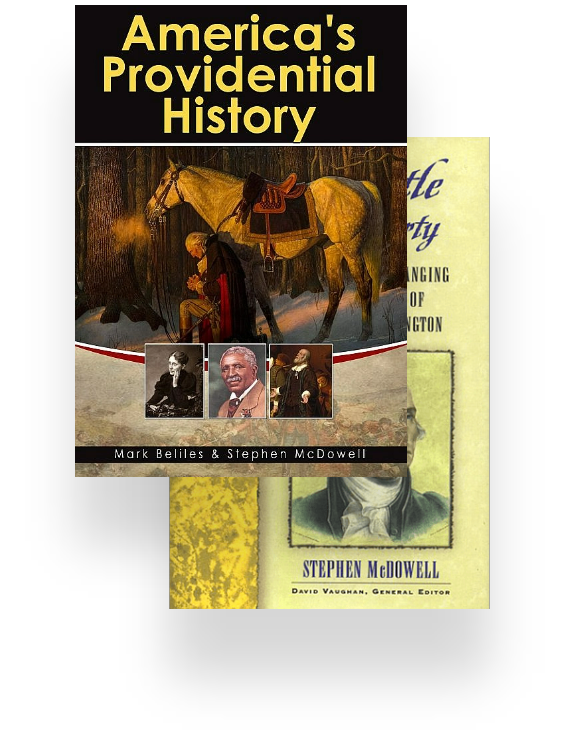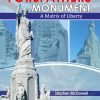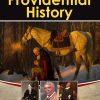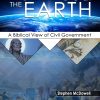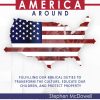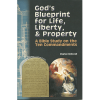Columbus’ Christian Character and Divine Mission
Excerpts from The Journal of Columbus’ First Voyage
In recent years many attacks have been leveled against Christopher Columbus, and western civilization in general. The target of the attacks of many is not so much against Columbus as it is against Christianity, which is the source of the values of western civilization. We see in these attacks an assault of the humanistic worldview against a Christian worldview.
To properly understand Columbus and others involved in the discovery and colonization of the Americas, we must view them in light of the world in which they lived. While Columbus had many shortcomings, his motives were most certainly Christian. Washington Irving writes of Christopher Columbus:
He was devoutly pious: religion mingled with the whole course of his thoughts and actions, and shone forth in his most private and unstudied writings. Whenever he made any great discovery, he celebrated it by solemn thanks to God. The voice of prayer and melody of praise rose from his ships when they first beheld the New World, and his first action on landing was to prostrate himself upon the earth and return thanksgivings. Every evening the Salve Regina and other vesper hymns were chanted by his crew, and masses were performed in the beautiful groves bordering the wild shores of this heathen land. All his great enterprises were undertaken in the name of the Holy Trinity, and he partook of the communion previous to embarkation. He was a firm believer in the efficacy of vows and penances and pilgrimages, and resorted to them in times of difficulty and danger. The religion thus deeply seated in his soul diffused a sober dignity and benign composure over his whole demeanor. His language was pure and guarded, and free from all imprecations, oaths and other irreverent expressions.
[The Life and Voyages of Christopher Columbus, Washington Irving, New York: Belford Company, n.d., pp, 632-633.]
Journal of First Voyage of Columbus
Columbus’ actual journals have been lost, but two of his companions, his son Ferdinand and Bartolome Las Casas, recorded abstracts of the original journal. At places they quote Columbus and in other places they summarize his journals. The following journal excerpts and quotes of Columbus are from the work of Las Casas, printed by Albert and Charles Boni, New York, 1924.
Writings in Columbus’ journal reveal his primary motive for sailing was his Christian convictions. He had a desire to preach the gospel throughout the nations, and in particular to take Christianity to the Great Khan of eastern Asia. About 200 years before Columbus’ voyage, Marco Polo, who had traveled throughout parts of Asia, brought word from the Khan of a desire for missionaries to be sent to his empire. Other Khans who had ruled since Polo’s time had also made this request. Columbus had studied the writings of Marco Polo’s travels and was also familiar with more recent requests for missionaries to be sent to teach the Christian religion.
* * * * *
He opens his journal of his first voyage with the following [the italized paragraphs are the comments of the editor]:
“In the Name of Our Lord Jesus Christ
“Whereas, Most Christian, High, Excellent and Powerful Princes, King and Queen of Spain and of the Islands of the Sea, our Sovereigns, this present year 1492, after your Highnesses had terminated the war with the Moors reigning in Europe, the same having been brought to an end in the great city of Granada, where on the second day of January, this present year, I saw the royal banners of your Highnesses planted by force of arms upon the towers of the Alhambra, which is the fortress of that city, and saw the Moorish king come out at the gate of the city and kiss the hands of your Highnesses, and of the Prince my Sovereign;1 and in the present month, in consequence of the information which I had given your Highnesses respecting the countries of India and of a Prince, called Great Can, which in our language signifies King of Kings, how at many tunes he, and his predecessors had sent to Rome soliciting instructors who might teach him our holy faith, and the holy Father had never granted his request, whereby great numbers of people were lost, believing in idolatry and doctrines of perdition. Your Highnesses, as Catholic Christians, and princes who love and promote the holy Christian faith, and are enemies of the doctrine of Mahomet, and of all idolatry and heresy, determined to send me, Christopher Columbus, to the above-mentioned countries of India, to see the said princes, people, and territories, and to learn their disposition and the proper method of converting them to our holy faith; and furthermore directed that I should not proceed by land to the East, as is customary, but by a Westerly route, in which direction we have hitherto no certain evidence that anyone has gone. . . .”
After reaching land, which he thought were islands off the east coast of Asia (or India), Columbus saw many natives, whom he called Indians. He spoke often of his desire to convert them to Christianity.
Friday, Oct. 12th. . . . “As I saw that they were very friendly to us, and perceived that they could be much more easily converted to our holy faith by gentle means than by force, I presented them with some red caps, and strings of beads to wear upon the neck, and many other trifles of small value, wherewith they were much delighted, and became wonderfully attached to us. . . . I am of opinion that they would very readily become Christians, as they appear to have no religion.”
Tuesday, Oct. 16th. . . . “They have no religion, and I believe that they would very readily become Christians, as they have a good understanding.”
Tuesday, Nov. 6th. . . . “I have no doubt, most serene Princes,” says the Admiral, “that were proper devout and religious persons to come among them and learn their language, it would be an easy matter to convert them all to Christianity, and I hope in our Lord that your Highnesses will devote yourselves with much diligence to this object, and bring into the church so many multitudes, inasmuch as you have exterminated those who refused to confess the Father, Son and Holy Ghost,2 so that having ended your days (as we are all mortal) you may leave your dominions in a tranquil condition, free from heresy and wickedness, and meet with a favourable reception before the eternal Creator, whom may it please to grant you a long life and great increase of kingdoms and dominions, with the will and disposition to promote, as you always have done, the holy Christian religion, Amen.”
Monday, Nov. 12th. . . . “Your Highnesses should therefore adopt the resolution of converting them to Christianity, in which enterprise I am of opinion that a very short space of time would suffice to gain to our holy faith multitudes of people. . .”
Tuesday, Nov. 27th . . . “The language of this people neither I nor any of my company understand, and we are perpetually making mistakes in our conversation with one another. . . . Henceforth, with the permission of our Lord, I shall use my exertions, and have the language taught to some of our people, for I perceive that thus for the dialect is the same throughout. Thus we shall acquire a knowledge of all that is valuable here, and shall endeavour to convert to Christianity these people, which may be easily done, as they are not idolators, but are without any religion. . . . Your Highnesses ought not to suffer any trade to be carried on, nor a foreign foot to be set upon these shores except by Catholic Christians, as the object and sum of the present undertaking has been the increase and glory of the Christian religion.”
Sunday, Dec. 16th. . . . The Admiral ordered every civility to be shown them, “because,” as he observes, “these are the best and most gentle people in the world, and especially, as I hope strongly in our Lord, that your Highnesses will undertake to convert them to Christianity, and that they may become your subjects, in which light, indeed I already regard them.”
Monday, Dec. 24th. . . “Your highnesses may be assured that there is not upon earth a better or gentler people, at which you may rejoice, for they will easily become Christians and learn our customs. A finer country or people cannot exist, and the territory is so extensive and the people so numerous, that I know not how to give a description of them. . . .”
Many other actions and writings of Columbus, as revealed in his journal of the voyage, reveal his Christian motivation and reliance upon God.
Wednesday, Dec. 12th. . . . A large cross was set up at the entrance of the harbour, upon a beautiful spot upon the western side, “as an indication” in the words of the Admiral, “that your Highnesses possess the country, and principally for a token of Jesus Christ our Lord, and the honour of Christianity.”
Columbus often gives thanks to God for good weather and providentially arranging the voyage and watching over him:
Monday, Jan. 14th . . . . he says that in spite of the bad state of his vessels he confides in our Lord, that as he has brought him to these parts, so he will in his great mercy return him; for his Heavenly Majesty knew what struggles it had cost him to set on foot this enterprise, and that he alone had favoured him before the King and Queen, all others in the most unreasonable manner opposing him.
Wednesday, Jan. 23d. . . . the sea all the time smooth as a river, “many thanks be to God,” says the Admiral.
Friday, Feb. 1st. . . . The sea very smooth, “thanks to God,” says the Admiral.
Saturday, Feb. 2d. . . . The sea very smooth, thanks to God, and the air soft.
Thursday, Feb. 14th. . . . He . . . comforts himself in reflecting upon the many mercies God had shown him in having enabled him to conquer all his adversities and hindrances in Castile, and accomplish his great discovery. And as he had made the service of God the aim and business of his undertaking, and he had hitherto favoured him in granting all his desire, he indulges a hope that he will continue that favour, and secure him a safe arrival. Especially he reflected that he had delivered him when he had much greater reason for fear, upon the outward voyage, at which time the crew rose up against him, and with an unanimous and threatening voice, resolved to return back, but the eternal God gave him spirit and valour against them all.
Columbus desired to use the profits from the voyages to finance the liberation of the Holy City, Jerusalem, from the control of the Moslems. This is mentioned in the following entry:
Wednesday, Dec. 26th. . . . He adds that he hopes to find at his return from Castile, a ton of gold collected by them in trading with the natives, and that they will have succeeded in discovering the mine and the spices, and all these in such abundance that before three years the King and Queen may undertake the recovery of the Holy Sepulchre. “For I have before protested to your Highnesses,” says he, “that the profits of this enterprise shall be employed in the conquest of Jerusalem, at which your Highnesses smiled and said you were pleased, and had the same inclination.”
Las Casas’ abstract of Columbus’ Journal ends with this entry:
Friday, March 15th. . . . And here, the Admiral says, this relation ends, but that he purposes to go to Barcelona by sea, being informed that their Highnesses are in that city, there to give them an account of his voyage, in which our Lord had directed and enlightened him. For although he believed without scruple that the Almighty created all things good, that all is excellent but sin, and that nothing can be done without his permission, “yet,” he observes, “it has been most wonderfully manifested in the circumstances of this voyage, as may be seen by considering the many signal miracles performed throughout, as well as the fortune which has attended myself; who passed so long a time at the court of your Highnesses, and met with the opposition of so many of the principal persons of your household, who were all against me, and ridiculed my project. The which I hope in Our Lord will prove the greatest honour to Christianity ever accomplished with such ease.”
Letter of Columbus to Rafael Sanchez
After his arrival in Lisbon, Columbus wrote a summary account of his voyage as a report for Ferdinand and Isabella. It was written as a letter to Rafael Sanchez, Treasurer for Ferdinand and Isabella, and clearly reveals Columbus’ Christian motivation. The following quotes are from this letter.
In his voyages, Columbus discovered many islands. He wrote, “I named the first of these islands San Salvador [which means holy savior], thus bestowing upon it the name of our holy Saviour under whose protection I made the discovery.” Other names he chose include Trinidad [for the Trinity], and Monte Cristi.
Columbus forbade his men from trading worthless articles to the Indians for things of value. He wrote:
“I prohibited their traffic on account of its injustice, and made them many presents of useful things which I had carried with me, for the purpose of gaining their affection, in order that they may receive the faith of Jesus Christ, be well disposed towards us, and inclined to submit to the King and Queen our Princes, and all the Spaniards, and furthermore that they may furnish us with the commodities which abound among them and we are in want of.
“. . . Throughout these islands there is no diversity in the appearance of the people, their manner or language, all the inhabitants understanding one another, a very favourable circumstance in my opinion, to the design which I have no doubt is entertained by our king, namely to convert them to the holy Christian faith, to which as far as I can perceive they are well disposed.”
Columbus ends this letter:
“. . . the great success of this enterprise is not to be ascribed to my own merits, but to the holy Catholic faith and the piety of our Sovereigns, the Lord often granting to men what they never imagine themselves capable of effecting, as he is accustomed to hear the prayers of his servants and those who love his commandments, even in that which appears impossible; in this manner has it happened to me who have succeeded in an undertaking never before accomplished by man. For although some persons have written or spoken of the existence of these islands, they have all rested their assertions upon conjecture, no one having ever affirmed that he saw them, on which account their existence has been deemed fabulous.”
“And now ought the King, Queen, Princes, and all their dominions, as well as the whole of Christendom, to give thanks to our Saviour Jesus Christ who has granted us such a victory and great success. Let processions be ordered, let solemn festivals be celebrated, let the temples be filled with boughs and flowers. Let Christ rejoice upon earth as he does in heaven, to witness the coming salvation of so many people, heretofore given over to perdition. Let us rejoice for the exaltation of our faith, as well as for the augmentation of our temporal prosperity, in which not only Spain but all Christendom shall participate. — Such are the events which I have described to you with brevity. Adieu.”
End Notes
- For background on the confict between Christian Europe and the Moslem Empire see, John Eidsmoe, Columbus & Cortez, Conquerors for Christ (Green Forest, Ark: New Leaf Press, 1992).
- This refers to the conflict with the Moor. See Eidsmoe.



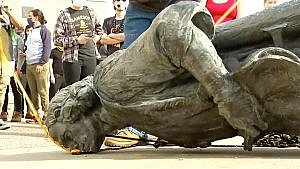
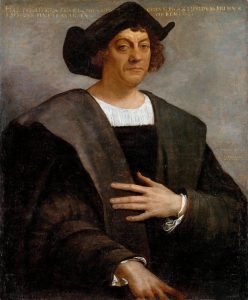
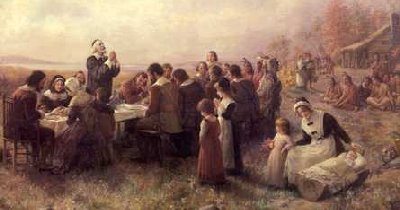 ded to set aside a day of Thanksgiving unto God, Whom they acknowledged as the Giver of all blessings and the only reason for their survival. It was indeed a miracle that they did survive their first year in the wilderness of New England and had a good harvest. Desire for a home where they could freely worship God, and the desire to “propagate… the Gospel of the kingdom of Christ” and be stepping stones for others to do the same, motivated a band of Christians later called Pilgrims) to set out on a hazardous voyage to plant a colony in the new world of America.
ded to set aside a day of Thanksgiving unto God, Whom they acknowledged as the Giver of all blessings and the only reason for their survival. It was indeed a miracle that they did survive their first year in the wilderness of New England and had a good harvest. Desire for a home where they could freely worship God, and the desire to “propagate… the Gospel of the kingdom of Christ” and be stepping stones for others to do the same, motivated a band of Christians later called Pilgrims) to set out on a hazardous voyage to plant a colony in the new world of America.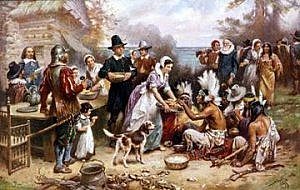





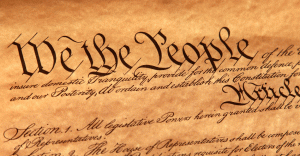 spoon, a delegate from New Jersey, answered their concerns as he said:
spoon, a delegate from New Jersey, answered their concerns as he said: